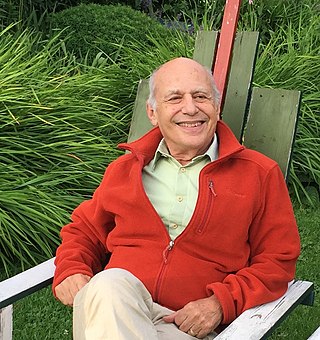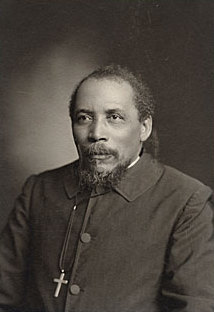Wilson Jeremiah Moses (1942-2024) was an African-American historian. He was Professor of American History at Pennsylvania State University. [1] [2]
Wilson Jeremiah Moses (1942-2024) was an African-American historian. He was Professor of American History at Pennsylvania State University. [1] [2]
Wilson J. Moses earned his A.B. and M.A. in British Literature at Wayne State University, and his Ph.D. in American Civilization at Brown University. He held the Walter L. Ferree professorship in the middle period of American History at Pennsylvania State University before that, and he currently is Professor Emeritus at Penn State. He has in the past held a series of posts at other American Universities:
He also has been a visiting professor at Harvard University, and given lectures at several European and African universities.

Afrocentrism is a worldview that is centered on the history of people of African descent or a view that favors it over non-African civilizations. It is in some respects a response to Eurocentric attitudes about African people and their historical contributions. It seeks to counter what it sees as mistakes and ideas perpetuated by the racist philosophical underpinnings of Western academic disciplines as they developed during and since Europe's Early Renaissance as justifying rationales for the enslavement of other peoples, in order to enable more accurate accounts of not only African but all people's contributions to world history. Afrocentricity deals primarily with self-determination and African agency and is a pan-African point of view for the study of culture, philosophy, and history.

Henry Highland Garnet was an American abolitionist, minister, educator, orator, and diplomat. Having escaped as a child from slavery in Maryland with his family, he grew up in New York City. He was educated at the African Free School and other institutions, and became an advocate of militant abolitionism. He became a minister and based his drive for abolitionism in religion.

Cheikh Anta Diop was a Senegalese historian, anthropologist, physicist, and politician who studied the human race's origins and pre-colonial African culture. Diop's work is considered foundational to the theory of Afrocentricity, though he himself never described himself as an Afrocentrist. The questions he posed about cultural bias in scientific research contributed greatly to the postcolonial turn in the study of African civilizations.

Charles Gabriel Seligman FRS FRAI was a British physician and ethnologist. His main ethnographic work described the culture of the Vedda people of Sri Lanka and the Shilluk people of the Sudan. He was a professor at London School of Economics and was influential as the teacher of men who became influential anthropologists, such as Bronisław Malinowski, E. E. Evans-Pritchard, and Meyer Fortes.

Alexander Crummell was an American minister and academic. Ordained as an Episcopal priest in the United States, Crummell went to England in the late 1840s to raise money for his church by lecturing about American slavery. Abolitionists supported his three years of study at Cambridge University, where Crummell developed concepts of pan-Africanism and was the school's first recorded Black student and graduate.
Stephen Skowronek is an American political scientist, noted for his research on American national institutions and the U.S. presidency, and for helping to stimulate the study of American political development.

Chicano poetry is a subgenre of Chicano literature that stems from the cultural consciousness developed in the Chicano Movement. Chicano poetry has its roots in the reclamation of Chicana/o as an identity of empowerment rather than denigration. As a literary field, Chicano poetry emerged in the 1960s and formed its own independent literary current and voice.

Simon David Goldhill, FBA is Professor in Greek literature and culture and fellow and Director of Studies in Classics at King's College, Cambridge. He was previously Director of Centre for Research in the Arts, Social Sciences, and Humanities (CRASSH) at the University of Cambridge, succeeding Mary Jacobus in October 2011. He is best known for his work on Greek tragedy.
Sir Adam Roberts is Emeritus Professor of International Relations at the University of Oxford, a senior research fellow in Oxford University's Department of Politics and International Relations, and an emeritus fellow of Balliol College, Oxford.
Tom Lutz is an American writer, literary critic and the founder of the Los Angeles Review of Books.

Melvyn Paul Leffler is an American historian and educator, currently Edward Stettinius Professor of History at the University of Virginia. He is the winner of numerous awards, including the Bancroft Prize for his book A Preponderance of Power: National Security, the Truman Administration and the Cold War, and the American Historical Association’s George Louis Beer Prize for his book For the Soul of Mankind: The United States, the Soviet Union, and the Cold War.

Ian Matthew Morris is a British historian, archaeologist, and Willard Professor of Classics at Stanford University.
The American Negro Academy (ANA), founded in Washington, DC in 1897, was the first organization in the United States to support African-American academic scholarship. It operated until 1928, and encouraged African Americans to undertake classical academic studies and liberal arts.

Johann Christoph "Jan" Assmann was a German Egyptologist, cultural historian, and religion scholar.
Paul Lawrence Farber was a professor of the history of science at the Oregon State University. He wrote or edited eight books about the history of science as well as dozens of articles. He was an elected fellow of the American Association for the Advancement of Science.

Frank Folke Furstenberg Jr. is the Zellerbach Family Professor of Sociology, Emeritus, at the University of Pennsylvania. His research focuses on the family in the context of disadvantaged urban neighborhoods and adolescent sexual behavior. Furstenberg has written extensively on social change, transition to adulthood, divorce, remarriage and intergenerational relations. Furstenberg is an elected member of the National Academy of Medicine, American Academy of Arts and Sciences, and American Academy of Political and Social Science.

Benjamin Tucker Tanner was an American clergyman and editor. He served as a bishop in the African Methodist Episcopal Church from 1886, and founded The Christian Recorder, an influential African American Methodist newspaper.

Andrew Radford is a British linguist known for his work in syntax and child language acquisition. His first important contribution to the field was a 1977 book on Italian syntax. He achieved international recognition in 1981 for his book Transformational Syntax, which sold over 30,000 copies and was the standard introduction to Chomsky's Government and Binding Theory for many years; and this was followed by an introduction to transformational grammar in 1988, which sold over 70,000. He has since published several books on syntax within the framework of generative grammar and the Minimalist Program of Noam Chomsky, a number of which have appeared in the series Cambridge Textbooks in Linguistics.
Peter Hamish Wilson, FRHistS is a British historian. Since 2015, he has held the Chichele Professor of the History of War chair at All Souls College, University of Oxford.
The history of black people in Cambridge, UK cannot easily be separated from the history of Cambridge University. The university has attracted students from Africa and the African diaspora to the town of Cambridge for more than two centuries. Several notable black people had a Cambridge association in the eighteenth and nineteenth centuries, and at the end of the eighteenth century Cambridge became a centre of abolitionist sentiment. From the end of the nineteenth century the university started to admit black students in larger numbers. In recent decades, however, the relatively low number of black students admitted to the university has become a topic of media comment and public concern.